China’s Vice-Premier Liu He ‘came to US against pressure’ to prove Beijing’s sincerity in trade talks
- Beijing’s top trade negotiator says he seeks ‘very candid exchange of views’ with US counterparts
- Talks coincide with US’ tariff increases on Chinese goods, which Donald Trump claims provoked greater urgency from Beijing

Before China’s Vice-Premier Liu He entered into negotiations with his American counterparts on Thursday, he told reporters that he was “hopeful” a deal was still within reach.
“I make this trip against the pressure because we want to show our highest sincerity,” he told China’s state media. “We also want to resolve some of our differences in a candid, rational manner with self-confidence. I believe there is hope.”
Liu needed all the positivity he could muster. Just a few hours before he made his comments, the US Federal Communications Commission said it had rejected an application by China Mobile to provide phone services in the US. Hours after that, the Trump administration made good on its threat to raise the tariffs on US$200 billion of Chinese imports to 25 per cent from 10 per cent.
Harvard-educated Liu is one of Chinese President Xi Jinping’s most trusted allies and manages a huge economic portfolio, including hi-tech development, which is a key area of friction between China and the US.

In dealing with US President Donald Trump, and US Trade Representative Robert Lighthizer – a man known for being a tough negotiator – Liu has an uphill task.